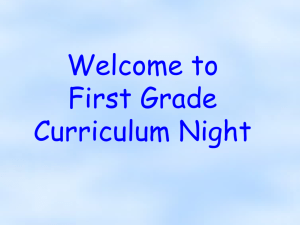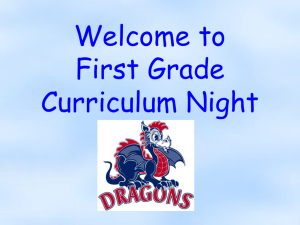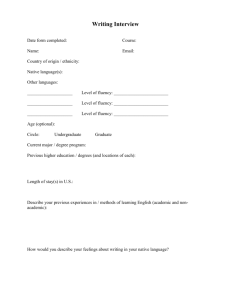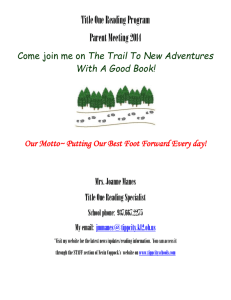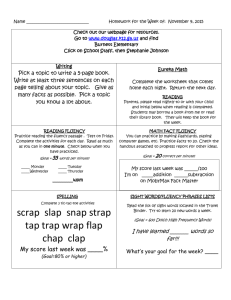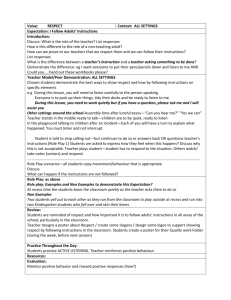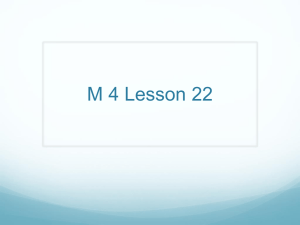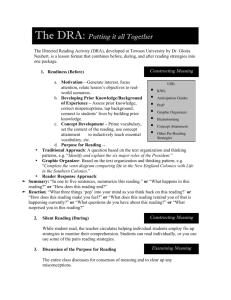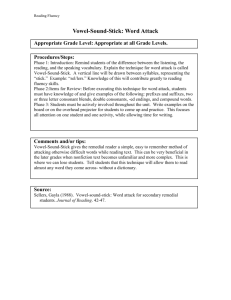Parent Information Night Slideshow
advertisement
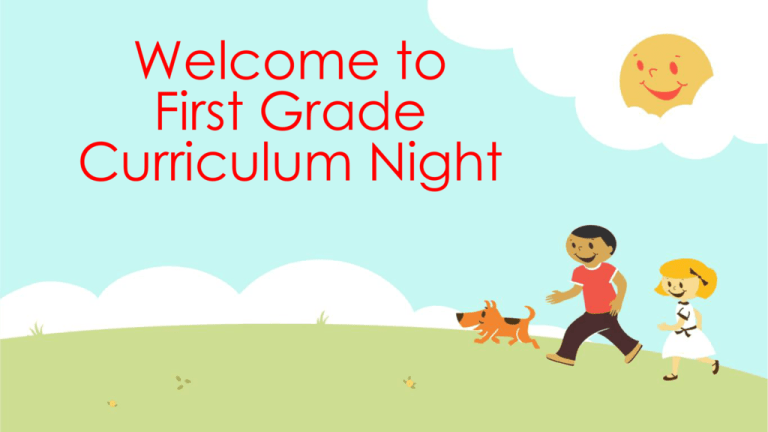
Welcome to First Grade Curriculum Night Join Remind 101 for TEXT reminders! This year I am going to be using the FREE APP Remind 101. All you have to do is subscribe via text: Enter this number 81010 Text this message @3113c School Hours and Attendance 7:30 Active Start 7:45 Students Sent to Classrooms 8:05 Tardy Bell Rings 9:00 Attendance Taken 2:55 Dismissal Begins Please have your child ALWAYS be in class! Much of what is taught is done hands on and can not be made up. If your child has a fever or vomiting, please keep him or her home for 24 hours. This is requested by most doctors. Transportation This must be done through the front office (fax) or a hand written note to the teacher by 2:00pm. We can NOT accept transportation changes via email. Snacks, Lunch, and Recess If your child would like to have a snack during the day, please make sure to remember: a healthy snack that does NOT need to be eaten with a spoon or fork. Water bottles may also be brought to school. Please send in a spill proof water bottle. Spills happen very easily! Lunch: 11:15-11:45 and Recess: 10:45-11:00 Checks/Cash can be sent to school with child’s name and ID number. Money can also be added to account online using a credit card. When visiting your child for lunch, there is a parent table for YOU and YOUR CHILD to sit at. You may not invite other students to eat with you. Shoes and Clothing The kids have recess everyday! We will go outside on days the weather permits. Your child will also need tennis shoes on Monday, Tuesday, and Thursday when they go to P.E. Do they need help tying their shoes? Check out this video on how to teach your child. Pack an extra set of clothes in their backpack. Not all accidents are bathroom related. Spills happen at lunch or sometimes puddles are hiding at recess. Birthdays and Invitations Please provide two days notice of a birthday treat being brought to school. The teacher will arrange a time with you that treats are handed out in class. Invitations must be sent for the entire class if handed out at school. Homework (45 minutes) Homework page will be found on the classroom website. Each week, your child will have a math page, reading comprehension page and will need to complete a word study activity. Read 20 minutes EVERY night. Grades Language Arts 50% is DRA, 25% daily, 25% major DRA grade is NOT included in the average for progress reports! Math, Science, Social Studies—40% daily, 60% major Literacy Assessements and Conferences DRA— Developed Reading Assessment (Assessed each marking period) 50% of L.A. Grade Beginning of the year: Level 4 (Level 3 is At-Risk) Middle of the year: Level 10 End of the year: Level 16 PAPI- Phonics Assessment (Assessed 3x a year) Beginning of the year conferences will take place once all assessments have been completed. I will be sending a link to sign-up online. What will my child learn in reading? Recognize and use individual sounds to create words, or phonemic awareness. Understand the relationships between written letters and spoken sounds, or phonics. This allows children to recognize familiar words accurately and automatically, and "decode" new words. Develop the ability to read a text accurately and quickly, or reading fluency. Learn the meaning and pronunciation of words, or vocabulary development. Acquire strategies to understand, remember and communicate what is read, or reading comprehension strategies. How can I help my child at home with reading? Writing Dear pair ants, Ur stoodnt wil b bringing hom riting, doo not b skaird ov the spelling. The inglish langwij iz kunfewzing two lern. Cids uz “phonetic” spelling in thair wrk to xpress thair thouts. Foursing cids too uz cunvenshunal speling reedoss thair dezir and abillite to right. It is mi joub to teech ur child 2 uz reesorsis and lerning to beecum a “Smartie Writer.” U can hlp ur child bi incoruging thim at eech divelupmentil stag. Axk ur child to reed and esplane thair riting to u. Az ur child lerns about the inglish langwij tha wil mak the tranzishun to “adult writing.” Thank u 4 ur saport! What will my child learn in writing? Create IDEAS to write about ORGANIZING writing to show a beginning, middle, and end Making decisions about WORD CHOICE Using CONVENTIONS Let me hear VOICE SENTENCE FLUENCY PRESENTATION of writing How can I help my child at home with writing? Encourage writing at home Allow children to sound out a word and spell it the best they can Encourage writing using different genres: Nonfiction and Fiction Making Lists and Letters Fantasy What will my child learn in math? Addition/Subtraction to 18 including missing addends Patterns in numbers: odd/even, skip count by 2s, 5s, 10s (forwards/backwards and starting from any number up to 120) Place Value: compare and order numbers Number Sense: order of numbers, greater than/less than, locate on hundreds chart Measurement: length, area, weight/mass, temperature, capacity Coins: name and value Shapes: 2D (plane) and 3D (space) Story Problems How can I help my child at home with math? Weekly homework Encourage your child to identify math in everyday situations. Name 3D shapes while in the grocery store. Practice adding or subtracting groups of objects. Math Facts - We want your child to know those math facts in a snap. Flashcards Practice counting a large group of objects by skip counting. Encourage your child to sort loose change by coin. Then, identify the coin and how much it is worth. What will my child learn in science? properties of matter moon and stars heat energy soil and rocks sound energy living vs. non-living light energy water motion magnetism weather (clouds) seasons food chain natural resources pet care life cycle of frog life cycle of chicken How can I help my child at home with science? Incorporate the use of non-fiction text as part of your child's reading practice. Visit your local library to supplement non-fiction reading material. Keep a science fact journal or poster of science topics. Your child may draw a picture of new found learning and record facts learned. Visit Brain Pop Jr., accessed through the Deretchin's website to reinforce key topics studied at school. What will my child learn in social studies? Citizenship: What is a good citizen Geography: Landforms Economics: Needs/Wants & Goods/Services Government: Who are our public officials and what do they do? What is voting? Culture: How are people alike and different? History: How have things changed over time? Texas/U.S. Symbols, Aesop’s Fables Resources How can I help my child at home with social studies? Practice reciting the U.S pledge and Texas Pledge Expose your child to different Texas Symbols Talk with your child about community helpers and their roles Talk with your child about what country, state, city, street they live in/on Practice reading a calendar and time line Read about the contributions of important people Talk with your child about changes in technology Discuss Needs and Wants Discuss Goods and Services D3: Dragons Digging Deeper Students will participate in "D3 Time" (Dragons Digging Deeper) for 45 minutes per day. During this time, students will enrich the learning from their classrooms by working on targeted areas based on the child's needs. Through data from common assessments and benchmarks, we are able to identify areas that the children need to fill in gaps, as well as, areas that the children need to extend their learning to a higher level. All students will participate in D3 time in order to advance their learning. What does reading look like in D3? Students will read and respond to level appropriate text based on students' individual DRA score. Students will strengthen skills by reading poetry, acting out reader's theaters, responding to literature, and increasing fluency. Fluency is the speed and accuracy at which your child reads out loud. An exiting first grader should read at least 60 words per minute. What does language look like in D3? Examples: Students will create words in word family. Generate words in the -at family. Students will make new words using letters in one longer word. Make as many new words as you can with the letters in president. Students will be engaged in activities based on word ladders, word sorts, word wall games, making big words, unscrambling words, word crosswords, vocabulary application What does math look like in D3? Example One: Students will review value and identification of each coin. Students will find value of coin amounts including combinations with pennies, nickels, dimes, and quarters. Example Two: Students will demonstrate mastery of basic addition and subtraction facts up to 18 with missing addends. Genius Hour Genius Hour is a time each week for students to participate in projects that reflect personal choices, interests, and passions. Click here to watch video!
